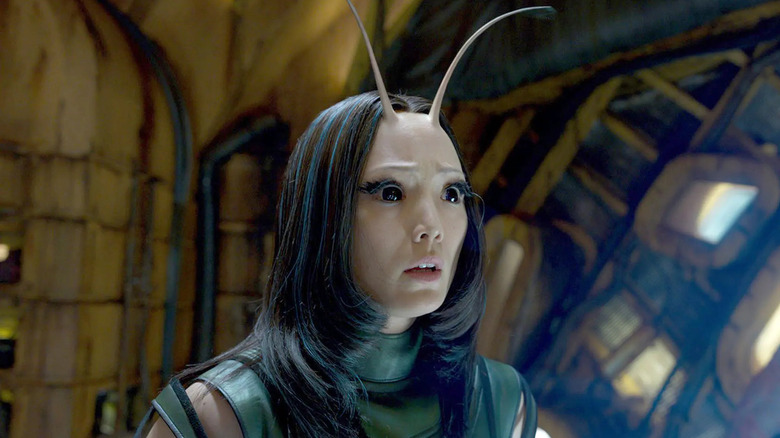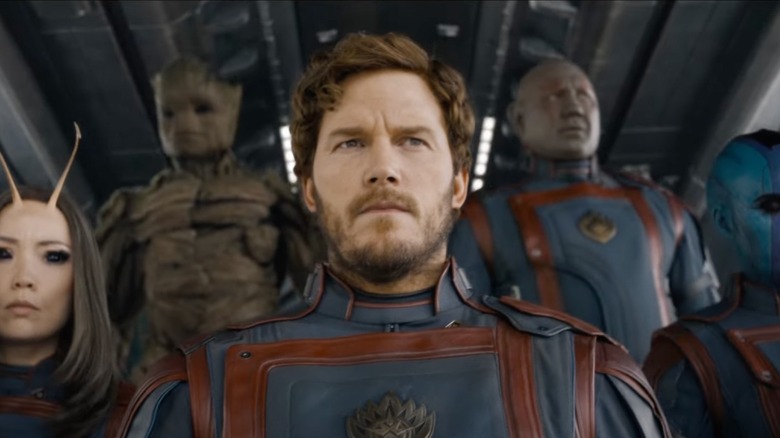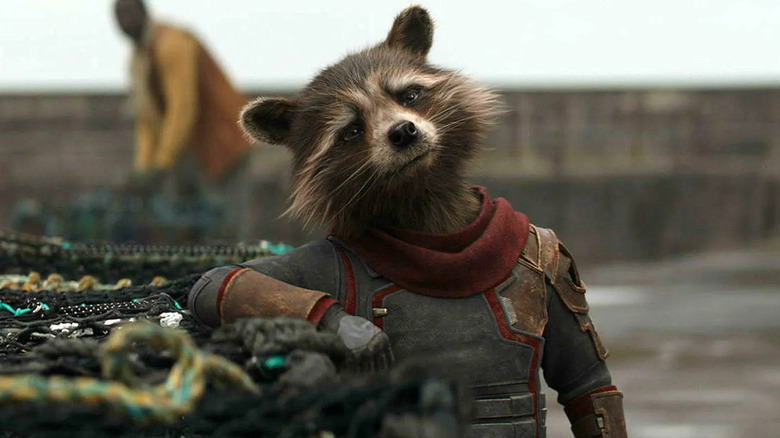A Key Guardians Of The Galaxy Vol. 3 Scene Throws The Entire Trilogy Into A Deeply Weird Moral Grey Zone
Spoilers follow.
At the start of James Gunn's 2017 film "Guardians of the Galaxy Vol. 2," the titular superhero team — a ragtag group of outsiders, mutants, and aliens — are seen defending a remote space outpost from a massive, monstrous, rainbow-vomiting space octopus. The creature is so resilient, it swallows Drax the Destroyer (Dave Bautista) and feels nothing as the warrior attempts to stab it multiple times from the inside. Eventually, the Guardians are successful, and the creature is vanquished. It seems that the Guardians' central job is to defend humanoid outposts from marauding, crazed animals. This notion is backed up by a mid-credits stinger in this year's "Guardians of the Galaxy Vol. 3," wherein the Guardians prepare to slaughter an oncoming stampede of hooved monsters that would otherwise lay waste to a nearby humanoid village.
The latter doesn't feel too good, however. "Vol. 3" was, up until that point, about the horrors of animal testing, and a great deal of time was spent with a young Rocket Raccoon (voice of Bradley Cooper) as he remembered the tortures he suffered as a lab animal for the High Evolutionary (Chukwudi Iwuju). It was also made sour by a scene earlier in the film when three of the Guardians, including the gentle psychic Mantis (Pom Klementieff), faced off against a trio of the rainbow-barfing monsters from the previous movie. Mantis, able to sense and alter people's moods, finds that the octopodes are intelligent beings who feel fear just as much as anyone. Mantis will end the film riding off on the monsters, now in a gentler mood, happy to commune with nature.
This means, of course, that in "Vol. 2," the Guardians enthusiastically murdered an intelligent being as part of their job. The question once again arises: should heroes kill?
Should heroes kill?
For many, the answer to this question is pretty cut-and-dry: yes they should. The Marvel Cinematic Universe is a superhero universe, and in superhero universes, there is a clear-cut sense of right and wrong. There are heroes who are good and villains who are bad. If a villain kills someone, it's an act of wickedness because villains do bad things. If a hero kills someone, it's an act of righteousness, because heroes do good things. When it comes to violence in a superhero world, everything is permitted, so long as one has been clearly defined as a hero.
When Thanos and his army kill heroes on the battlefield, it's a horror. When Iron Man uses the Infinity Stones to wipe out thousands of soldiers on the same battlefield, it's a triumph. And it's a triumph because Iron Man is a "good guy." Never mind that thousands of people are now dead by his direct actions. Also never mind that Iron Man could have wished for anything with the Infinity Stones, and actively chose to use them as an instrument of death.
The Guardians of the Galaxy are, of course, the flippant "wise guys" of the MCU, so their comedic disregard for sentient life was initially part of the gag. Rocket Raccoon regularly stole the prosthetic limbs of disabled people and laughed at their misfortune. The Guardians weren't necessarily good, upstanding citizens, but rascals and jerks forced into making good decisions by circumstance. Over the course of their multiple film appearances, however, the Guardians softened, becoming more sympathetic to one another's plights. They were outsiders who, resentful of being rejected by society, huddled together for warmth in their strange, caustic found family.
One might think this would instill in them an aversion to killing. No such luck.
Growing up and turning to pacifism
By "Guardians of the Galaxy Vol. 3," one might assume that the Guardians themselves, having worked through so many of their issues (mostly surrounding abusive fathers) would be more compassionate. They might begin to look at tortured cyborg animal monsters and see not enemy soldiers but lost souls looking for a home. Indeed, Rocket especially would be sympathetic, as he was made an intelligent humanoid by the exact same means as his cyborg attackers. The moral of the film should dictate that Rocket would attempt to reach out to the monsters rather than shooting them dead on site.
Of course, most film audiences don't want superhero films wherein the righteous characters speak sensitively and diplomatically to their enemies. They want fights and gun battles where brains end up all the walls. There is catharsis to movie violence, handily enacting a stripe of brutal "simple solution" fantasies of viewers. In the morally absolute universe of the MCU, killing a hallway of baddies is completely justified. After all, they're bad.
But by the end of "Vol. 3," it seems that the Guardians should be beyond such simple revenge fantasies. Indeed, after Mantis found that a creature the Guardians had previously killed was indeed intelligent, all of them should pause to consider what they've been doing. How many lives has Star-Lord (Chris Pratt) taken? Or Rocket? Or Groot (voice of Vin Diesel). Both Gamora (Zoe Saldaña) and Nebula (Karen Gillan) were villains in earlier lives, but their lives as heroes don't seem to be any less deadly. Neither of them ever pauses to debate the ethics of murder.
Despite their growth and maturity, murder is still on the table for the Guardians.


